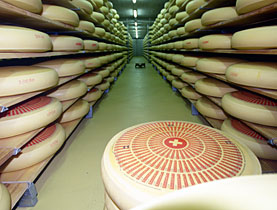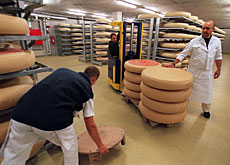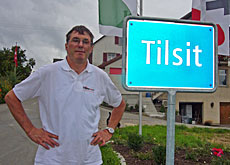Cheese expects competitive squeeze to harden

The Swiss cheese industry is starting to smell tough times ahead despite bucking the economic trend in recent years with bumper exports.
Overseas sales of Swiss cheeses flew in the face of the strengthening franc by increasing yet again in the first quarter of this year. But this rate is expected to drop and the domestic market is becoming more crowded.
Cheese has been flying the flag for Switzerland’s beleaguered export industry for some time. Last year, exports grew 1.6 per cent to 62,000 tonnes while manufacturing production in other sectors was struggling.
Exports of one of Switzerland’s most famous products were up a staggering 9.9 per cent in the first three months of this year compared with the same period in 2009.
However, there are signs that the boom is about to level out. April’s figures show an 8.1 per cent fall in Swiss cheese exports, although the annual rate since the beginning of this year is still up 5.2 per cent.
This is hardly a signal for panic, but Switzerland Cheese Marketing cannot see exports continuing on such a successful upward curve for the rest of the year, despite customers still showing willing to pay higher prices for Swiss quality.
Changing pecking order
“The falling euro has until now been balanced out by the strong reputation of the Swiss brand, but we have now reached the limit,” spokeswoman Manuela Sonderegger told swissinfo.ch. “We are calculating for less demand in European markets such as Germany and Italy.”
Germany, in particular, has seen falling prices for dairy products that cannot be matched by Swiss producers who are battling with the effects of a strong franc against the euro.
Switzerland’s most successful cheese export, Emmental, is facing tougher competition from rival brands in other countries that bear its name despite the Swiss cheese being awarded a Protected Designation of Origin label six years ago.
Last year, for the first time, production of Gruyère cheese outstripped Emmental in Switzerland – also in part due to fewer producers making Emmental in recent years.
While sales of Emmental and another Swiss favourite, Tilsiter, have been falling, cheese exports have been boosted by a rise in popularity for other specialist alpine cheeses so far this year.
Cheese industry experts believe this could be down to a rise in popularity abroad for “Swissness” – products that carry a quintessentially Swiss image, such as mountains and cows.
Imports rising
But such alpine cheeses only make up a small proportion of total exports. And the recent sales figures have to be read in the seasonal context of fresh batches generally hitting the shelves at the beginning of the year.
Swiss cheeses are expected to be squeezed between the twin pressures of an export slowdown combined with a dilution of the domestic market by cheaper foreign products.
Swiss consumers have had more choice of foreign cheeses on supermarket shelves since trade barriers were dismantled between Switzerland and the European Union in 2007.
“Consumers in the domestic market have traditionally favoured Swiss cheeses, but now in an open market, consumers are starting to eat more imported products from foreign competitors, especially soft cheeses,” Sonderegger, from Switzerland Cheese Marketing, told swissinfo.ch.
Some Swiss cheese producers, such as dairy giant Emmi, welcomed the relaxation of cross-border trade three years ago as presenting an opportunity to gain more access to the European market.
Twin challenge
But for smaller, more specialised producers, the liberalisation of the cheese trade could have negative consequences. Statistics show that foreign cheese imports (up 5.2 per cent so far this year) are keeping pace with the rate of Swiss exports.
But the rate at which some foreign soft cheeses are hitting the Swiss supermarket shelves is rising at a much higher rate. The combined imports of soft cheese staples Roquefort, Gorgonzola and Danablu climbed 151 per cent between the start of the year and the end of April, while Mozarella imports were up 26 per cent.
“We face a real challenge to maintain our hold on the domestic market and not lose out to cheaper imports,” Sandra Helfenstein, from the Swiss Farmers’ Union, told swissinfo.ch.
But not all is lost and local cheese producers are fighting back with the establishment of a Swiss mark of origin that informs consumers that they are buying patriotically.
Swiss cheese is here to stay, according to the industry, but it is facing up to modern commercial challenges just as much as other sectors.
Matthew Allen, swissinfo.ch
Industry statistics show that Swiss cheese producers enjoyed bumper export years in 2009 and 2008 despite the growing global economic problems.
More than 62,000 tonnes of Swiss cheese were exported in 2009, up 1.6 per cent on the previous year.
That beat the previous record set in 2008, a year that saw exports increasing by 3.2 per cent.
The first three months of 2010 showed no end to the cheese export boom, with an incredible 9.9 per cent rise.
But a mini-slump in April, that saw exports fall eight per cent on the same month in 2009) dragged the cumulative annual growth rate down to 5.2 per cent.
Emmental is still the most popular traveller, making up 29% of all Swiss cheese exports. With Gruyère the next most popular brand overseas (17.4%).
Europe is by far the largest export market, with Germany, France and Italy being the countries that consume most Swiss cheese.
Foreign cheeses coming into Switzerland have also been on the rise and the rate shows no sign of declining.
From the start of the year until the end of April, foreign cheese imports rose 5.2% .
The soft cheeses Danablu, Roquefort and Gorgonzola combined saw a massive 151% rise while Mozzarella climbed 26%.
Industrial processed cheese from abroad rose 23.2% in the first four months of this year.

In compliance with the JTI standards
More: SWI swissinfo.ch certified by the Journalism Trust Initiative












You can find an overview of ongoing debates with our journalists here . Please join us!
If you want to start a conversation about a topic raised in this article or want to report factual errors, email us at english@swissinfo.ch.